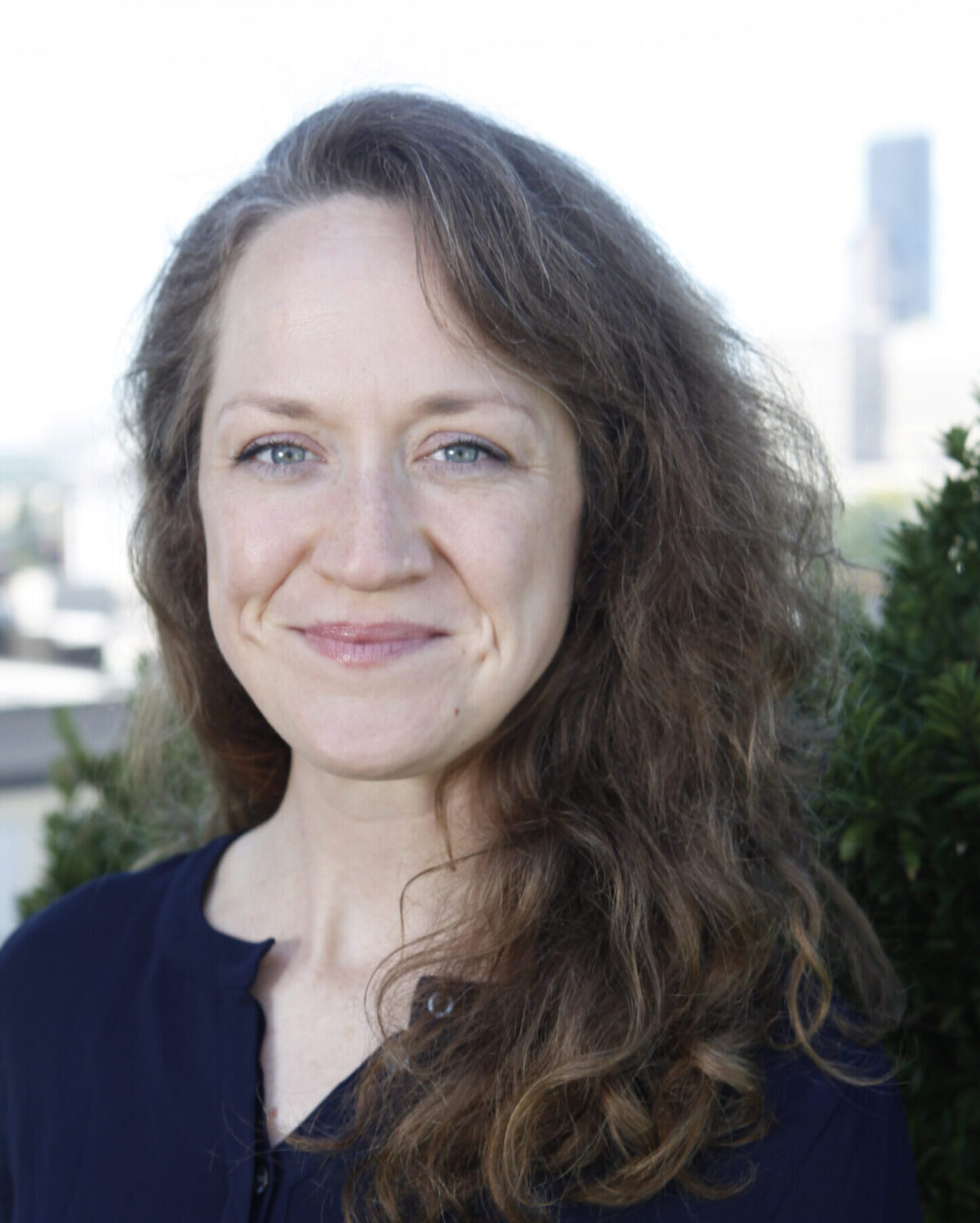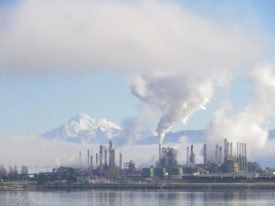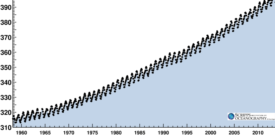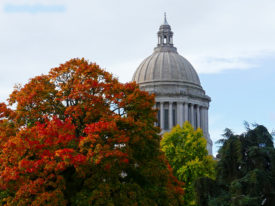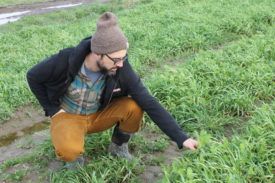Alan
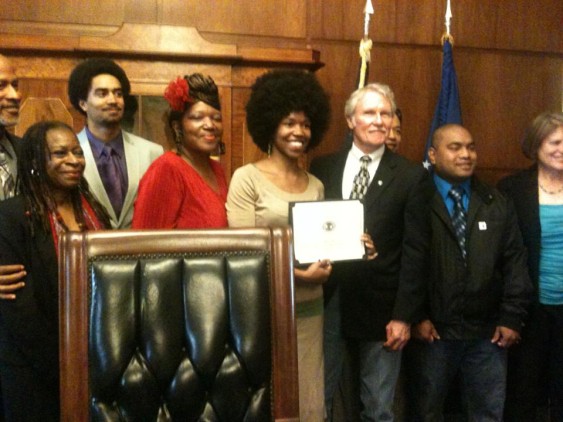
Amber Starks w OR Gov. Kitzhaber, after signing of Natural Hair Care Act in Salem. Photo credit Amber Starks.
From the we’re-so-proud department: Here is a photo of Sightline friend and hair-braiding activist Amber Starks with Oregon Governor John Kitzhaber, right after the governor signed the Natural Hair Care Act in Salem this week. We’re so proud to have helped launch this remarkable success!
Favorite funny news item of the week: Ecuador, pressured by the United States to deny asylum to Edward Snowden with the threat of losing its trade status, offers a grant of $23 million in aid for US human rights education programs. As we used to say in elementary school, “Burn!”
As we said two years ago, bike-share riders should be exempt from helmet laws. Here’s a well-written version of the same argument focused on Vancouver, BC, where bike share is still in the works.
Pam
Every river in the 48 states, on a map.
Anna
A map of each US state’s highest paid public employee hints at our nation’s real priorities (Spoiler: It’s pretty much football, and maybe sometimes basketball). You hear about this all the time, but seeing it in all its graphic glory is a little startling.
Fox goes full throttle with BS about climate change in their “news” programming. Watch anchor Megyn Kelly cut off the President’s climate speech to talk to card-carrying climate denier, Chris Horner. It almost goes without saying that the organizations that gave this guy his “credentials” have financial ties to Koch Industries and other fossil fuel interests.
Meanwhile, here’s a snapshot of how cable news basically ignored Obama’s climate speech—all but The Weather Channel, which aired the whole thing.
And, while we’re at it, Climate Progress brings us a startling map of the US, showing climate deniers “representing” the American people in the US 113th Congress. Are you seeing red?
Finally, here’s an interesting animated GIF that maps the evolution of marriage equality (or lack thereof) in the US between 1970 and this week’s historic ruling on DOMA.
Serena
Clearly, the entire Ballard community knows that it’s my birthday tomorrow, and Sustainable Ballard decided to hold this awesome event in my honor: the Ballard Edible Garden Tour turns five this year, while I turn (an ever nerdier) three cubed. Go!
I finished Elizabeth Cline’s Overdressed: The Shockingly High Cost of Cheap Fashion earlier this week, having purchased it after her interview on Fresh Air shortly after the Bangladesh factory collapse in April. The book laid out how the industry came to be where and how it is, and what consumers and workers lost in the process; but more than that, it showcased the possibilities for a “slow fashion” future, featuring designers and retailers already blazing that trail, as well as individuals trying their hands at sewing for themselves. While I couldn’t identify with the cheap fashion shop-aholism the author admitted to suffering in the past (I generally dislike shopping), I could identify with the disappointment with what’s on offer from most retailers. Anyway, it’s a good place to start understanding more about the huge industry we are all (save nudists?) a part of every day. Pretty sure I’ll be signing up for sewing classes soon, too. Anyone have recommendations?
I heart Texas Senator Wendy Davis—who, by the way, seems ready for round 2.
The tragedy of the Voting Rights Act decision on Tuesday still confounds me. As Justice Ruth Bader Ginsberg put it, “The sad irony of today’s decision lies in its utter failure to grasp why the VRA has proven effective… Throwing out preclearance when it has worked and is continuing to work to stop discriminatory changes is like throwing away your umbrella in a rainstorm because you are not getting wet.” Now, to cheer up a tad, see this.
This Kickstarter project grabbed my eye recently. It would support a new documentary about the Northwest’s proposed coal exports, with interviewees including Bill McKibben and the Power Past Coal campaign’s Beth Doglio. Check out the trailer and then try to tell me you don’t want to give the project money:
Eric
If there’s a better illustration of the short-sightedness of unsustainable economic development, I don’t know what it is.
Crosscut’s Floyd McKay has an insightful look at the troubled Oregonian newspaper, which recently announced that it is laying off many of the region’s best reporters.
Harper’s magazine revives a 1933 piece by Robert Littell, What the Young Man Should Know. It’s a gem.
The Everett Herald has a very good editorial on the coal export debate, drawing a comparison between tobacco and the world’s dirtiest fossil fuel.
If you haven’t already seen the half hour KCTS documentary on Northwest coal exports, you should watch it. I know a lot of folks were steamed that it didn’t give any face time to professional advocates like me, but I think the piece is in some ways stronger for being told in the words of others. (An aside: my friends Doug Howell and Nancy Hirsh have raised a truly amazing kid.)
As we begin to learn about the crude oil-by-rail schemes multiplying across the Northwest, here’s a good graphic by Jarred Figlar-Barnes, a seventeen-year-old student at Elma High School. He compares the nuclear cooling towers at Satsop—the biggest buildings in his neck of the woods—to the size of a typical Panamax vessel.

Graphic by Jarred Figlar-Barnes.
These are the kinds of ships that would be calling routinely at Grays Harbor to transport large volumes of crude oil past sensitive coastal areas.
I’ll be spending a portion of this weekend in the North Cascade’s hallowed Boston Basin. Whenever I’m in that region I invariably recall a poem by Kenneth Rexroth called “A Living Pearl.” Here’s a brief excerpt:
Only the signing of frogs
In the snow-wet meadows, the shrill
Single bark of a mountain
Fox, high in the rocks where the
Wild sheep move silently through the
Crystal moonlight. The same feelings
Come back. Once more all the awe
Of a boy from the prairies where
Lanterns move through a field,
Home; all the thrill of youth
Suddenly come from the flat
Geometrical streets of
Chicago, into the illimitable
And inhuman waste places…
If you haven’t read Rexroth, go buy yourself a book today and spend this summer absorbing his work. That’s my advice anyway.


